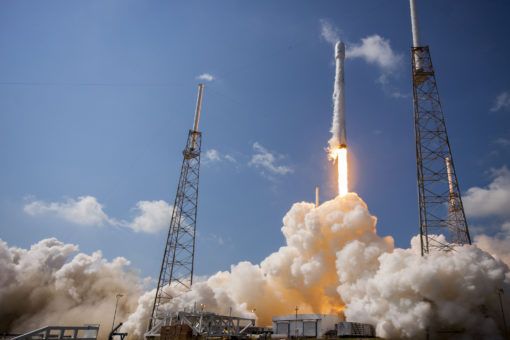Expert questions tax agency’s push for space launch taxes
by Chris Reed | May 10, 2017 10:40 am
 One of the world’s leading experts on the commercialization of space questions the California Franchise Tax Board’s move to make the Golden State the first to impose state taxes on private space launch and tourism firms.
One of the world’s leading experts on the commercialization of space questions the California Franchise Tax Board’s move to make the Golden State the first to impose state taxes on private space launch and tourism firms.
John Logsdon, co-founder of George Washington University’s Space Policy Institute, told the San Francisco Chronicle[1] that the commercial launch business was heating up, with private “spaceports” as well as leased military facilities being use to send cargo and – before long – tourists in the state.
The $2 billion in revenue that launch firms generated in 2014 worldwide is expected to continue to grow and make it a lucrative niche industry. Elon Musk’s Hawthorne-based SpaceX[2] company is one of the world’s best-known space firms; a recent launch is pictured above. Vandenberg Air Force Base on the Santa Barbara County coast is considered a superior launch facility.
Against this backdrop, Logsdon questioned why California would seek to lead on space taxation: “States that don’t levy taxes would have that competitive advantage over states that do. If California puts in a tax and Florida or Texas doesn’t have a similar tax, I’m not sure that helps California in a competitive way.”
But Thomas Lo Grossman, the Franchise Tax Board official interviewed by the Chronicle, contended that the tax regulatory framework would actually make private launch firms more comfortable being based in California.
As a recent Quartz.com analysis [3]noted, the state framework[4] is what space companies prefer as the overall basis for taxation and hope it is copied by governments around the world.
“The complicated new formula … sets a tax rate based on how often rockets are flown from California. It uses the 62-mile trip to space as a standard, and reduces the levy on revenue earned in launches from other sites,” wrote space business reporter Tim Fernholz. “The new rules, based on formulae used for terrestrial transport industries, appear to ensure that a California-based company like SpaceX won’t be excessively taxed for revenue generated by launches in other states, while Colorado-based ULA pays its fair share for using California spaceports.”
Florida has already lured away California space venture firm
But unlike Quartz, the Chronicle report addressed Logsdon’s point about the business-friendliness of California becoming the first to levy a state tax in a nation in which a half-dozen states already have launch sites and many more are interested in building them. It noted that Moon Express[5] – a well-financed venture capital firm[6] that hopes to mine the moon for valuable natural resources – had relocated from Mountain View in the Bay Area to Florida. Company CEO/founder Bob Richards cited incentives proved by Space Florida[7], the state’s ambitious space economic development program.
California’s state efforts to promote space economic development are based with the Office of Strategic Technology[8] in Los Angeles County – but space is only one industry the office seeks to help, unlike Florida’s more specific approach. Project California’s Council on Science and Technology also does some related work.
The Franchise Tax Board will consider adopting the rules after a public hearing on June 16. The board is taking comments on the FTB proposal[9] until June 5.
- told the San Francisco Chronicle: http://www.sfchronicle.com/business/article/California-plans-for-collecting-taxes-on-11119631.php
- SpaceX: http://www.spacex.com/
- analysis : https://qz.com/977207/californias-plan-to-tax-rockets-by-the-mile-is-exactly-what-spacex-ula-and-virgin-galactic-want/
- state framework: https://www.ftb.ca.gov/law/regs/25137-15/06162017-draft-text-for-Notice.pdf
- Moon Express: http://www.moonexpress.com/
- venture capital firm: https://www.theguardian.com/science/2017/jan/17/moon-express-raises-20m-for-2017-voyage-to-moon
- Space Florida: http://www.spaceflorida.gov/
- Office of Strategic Technology: https://www.library.ca.gov/CRB/96/11/sgedp.html
- FTB proposal: https://www.ftb.ca.gov/law/regs/25137-15/06162017-draft-text-for-Notice.pdf
Source URL: https://calwatchdog.com/2017/05/10/expert-questions-tax-agencys-push-space-launch-taxes/